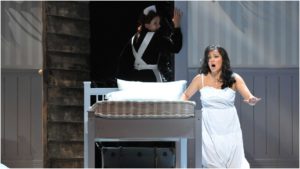
Opera Profile: Tchaikovsky’s Iolanta
By Logan MartellFirst premiering on December 18, 1892, “Iolanta” is the final opera composed by Pyotr Illyich Tchaikovsky. The libretto was penned by his brother, Modest Tchaikovsky, and adapts a German play by Henrik Hertz known as “King Rene’s Daughter.” First reading the play in an issue of The Russian Messenger, Tchaikovsky found himself enamored with the originality of the plot and the lyrical nature of its writing; he would spend the next few years following this inspiration as he composed the score for what would become “Iolanta.”
Short Plot Summary
Blind from birth, Iolanta has grown up in an enclosed garden near the castle of her father, King Rene. The king has managed to keep Iolanta unaware of her blindness and her caretakers, Bertrand and Martha, wait on her hand and foot; despite this, Iolanta cannot help but feel that she is missing something precious. Soon Iolanta is visited by the king, bringing with him Ibn-Hakia, a Moorish doctor who is confident he can restore Iolanta’s sight, but only if she is first made aware of her blindness. The king refuses this, fearing that failure would bring Iolanta great sorrow after learning that she cannot see.
Soon the court is visited by Duke Robert, who is betrothed to Iolanta, and his friend, Count Vaudemont. Robert expresses his desire to be free from his engagement, as he has fallen in love with a countess. When Vaudemont finds his way to Iolanta’s garden, where he finds her sleeping, he falls in love with her; Robert leaves to bring Vaudemont assistance when he believes his friend has been enchanted by Iolanta. When the girl awakes, Vaudemont asks her to give him a red rose and, when she twice hands him a white rose, realizes that she is blind.
The king soon discovers the lovers, and readies to execute Vaudemont for not only entering the secret garden, but for sharing with Iolanta the knowledge of her blindness. To spare him from execution, Iolanta readies herself to undergo Ibn-Hakia’s treatment, although she is unsure if she even wants to be able to see or not. While the treatment happens, the king explains to Vaudemont in private that his fury was necessary for Iolanta to make a decision, and he dissolves the marriage contract between her and Duke Robert. His daughter successfully completes her treatment, and although she is awed by the world she now sees around her, her love for Vaudemont and their coming marriage give her the strength to face what life will bring next.
Famous Musical Sections
The score is particularly notable for its opening prelude with features only winds. It eventually introduces strings on their own before fusing all the orchestra colors. The love duet is the best-known moment in the opera, as is the grand finale, both featuring some of Tchaikovsky’s most uplifting melodies.
Watch and Listen
Anna Netrebko is undeniably one of the greatest proponents of the work, her interpretation essentially reviving the opera in modern times. Here is one recording from one of her first interpretations in Russia.
WARNING: There is no English translation or subtitles.
Categories
Opera Wiki

